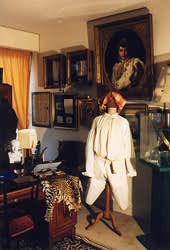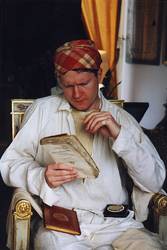The birth of an exceptional collection
David Chanteranne: Despite your youth, you already have a very important collection, both in size and quality. What was it that brought you to Napoleon and the First Empire in the first place?
Pierre-Jean Chalençon: When I was seven, my parents offered me an educational cartoon book (published by Nathan) on the story of Napoleon. I liked the book so much that I pestered my father to let us go to visit Malmaison, the Army Museum in Paris and Fontainebleau. Seeing the things did the rest. That's where my passion for all things Napoleonic comes from. But I never once thought that I would end up collecting like I do today. I was miles away from that. It was a passion. Nothing more.
D.C.: How then did you end up collecting and what was your first 'piece'?
P.-J. C.: My first piece was a proclamation by the Prefect of the Bouches-du-Rhône announcing the return of Napoleon from Elba in 1815. My mother bought it for me at a shop which sold autographs in St-Germain-en-Laye near Paris. I was fourteen, and I wanted to carry on.
D.C.: As for your collecting today, is it something you like to do, or is it something you have to do?
P.-J. C.: Oh, it's a need. For me it's an irresistible train of events, it's like a drug. To begin with I was very particular, only buying autographs. Then by selling some of my documents I was able to acquire items and works of superior quality. Now this 'disease' has really taken hold. I need it to live. It's like a gigantic jigsaw, but one for which I want to get to the end, but I don't know where the edges are.
D.C.: Is your collection limited to the First Empire?
P.-J. C.: No, in fact, it's Napoleon himself which interests me; much more so than his reign. And that is something which explains some of my collecting choices and how I have bought. For example, I bought an autograph letter signed by a fifteen-year old Napoleon – now that's well before the Consulate and the Empire. He was asking a member of his family to visit him at Military School, but at certain times of the day and under certain conditions. You can already see the Emperor in him. It's extraordinary and yet at the same time quite simply fascinating. That's why I also preferred to buy the sleeve of one of the uniforms of the first consul rather than a painting of Bonaparte dressed in a fabulous velvet costume by Gros or Ingres. The point for me is not to have a work which is known the world over, but to have an object, something of the great man which leads to greater historical understanding.
Buying at auction : an expert at work
D.C.: When you move to acquire an item, do you do it follow a buying policy or do you rather follow your nose?
P.-J. C.: I call it 'well-prepared love at first sight'. When I see an object, I analyse it, I value it, I take it apart in my mind, I find out as much as I can about it. I have many curator friends, and I always try to get their opinion, to try to confirm my first conclusions. I then see if the object would fit into my collection, whether it sheds light on an object which I already possess. All this absolutely has to be done. But it's true that if in the end I'm going to take the plunge, there has to be that little extra something. What you might call the 'trigger', the 'irrational act'.
D.C.: Have there been times when you have decided not to buy a lot you were interested because in the end the quality just wasn't there?
P.-J. C.: Yes, of course. Quality is the most important thing for a work. Perhaps it's a little subjective as a tool, but it always works at the last resort. Every time there's an buying opportunity or auction, I always ask myself one question 'Is it good enough to find a place in an exhibition, does it have 'museum quality'?' For me it's got to have the label 'quality'. That's fundamental! If the provenance is well established and you've got a certificate of authenticity, then you've some very strong allies.
D.C.: Do you enjoy the atmosphere in auction rooms?
P.-J. C.: I love it and I hate it. It like a casino with everyone excitedly watching the first turn of the roulette wheel. First of all you go to the expert, then you read the catalogue and the documentation, then you sound out everyone's opinions. But once the curtain's up, your heart beats faster, your hand shakes, you get an adrenaline rush. It's appallingly wonderful. You can really imagine how the buyer in the film l'Homme pressé with Alain Delon feels. At the end of the film the central character dies from a heart attack after having waited for the object of his dreams. I've often had this type of emotion – I nearly fainted at one auction…
D.C.: Of all the auction houses in the world, which do you like best of all?
P.-J. C.: Drouot, Paris. The auctions in England are too closely guarded, too distinguished, a little too cold. As for American auctions, they're far too showy. I think France is the only place where you still get that impression of 'Ali Baba's cave' that I enjoy so much. Here you get all sorts of things, it's a bit like a bric-à-brac shop – you nearly always find what you're looking for, regardless the genre of piece you want. Drouot's a real treasure store. You get the best price there. That was how I managed to put together my modest trove. I couldn't have done it buying from antique dealers. There the price would have been six to ten times more expensive. At the moment things are not quite so easy, but I think that the Napoleon bi-centenaries aren't helping. People seem to be more and more interested in Napoleon. What's more, even the Russians are starting to stick their oar in.
The Chalençon Collection



